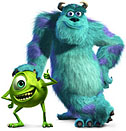
Movie Guru Rating:

Comment
on this review
| |

Pixar restores our faith in movies, again, with Monsters, Inc.
by Coury Turczyn
There comes a time in everyone's life when the movies stop wielding the same magic that they used to when you were a kid. Perhaps that line is crossed after you've seen the 23rd carbon-copy of a favorite movie you first saw a dozen years ago. Or maybe it was your 56th last-second bomb defusement involving a choice between cutting the blue wire or the red wire, or your 234th car chase ending in a ball of fire, or your third Adam Sandler movie. Somewhere along the line, you stop giving the movies your whole heart. You hold that suspension of disbelief ever closer to the ground, because now you know how often movies crash.
Childhood was different. Back then, every movie was a transportive experience that you flung yourself into, mind and body. You didn't just watch from the confines of a sticky theater seat—you were actually in Oz or on the Death Star (or, in my sad case, trapped with the helpless crew of the space freighter Nostromo and about to get my chest burst wide open by an acid-spewing Alien). Wherever there was adventure to be had, we went—no questions asked, trusting that the filmmakers could take us there.
These days, we adults ask plenty of questions ("Why did George Lucas think a Jar-Jar fart joke would be funny?"), probably too many to completely immerse ourselves within a filmed fantasy world. But every time we lose ourselves for even a few minutes in a movie, we touch the sensations of childhood. To find a movie that can successfully transport us back to that mindset—to overcome our jadedness—is a quest we undertake every time we go to the theater. Sure, there are plenty of movies that provide us with laughs, or thrills, or even food for thought...but to completely take us out of our pensive selves is a small miracle.
Amazingly, Pixar Animation Studios is now four-for-four in that department. Its computer-animated films are self-contained worlds of wit, comedy, and feeling—grand entertainments that not only achieve technical brilliance, but tell genuine stories that defy cynicism. With Toy Story, A Bug's Life, Toy Story II, and the new Monsters, Inc., Pixar has conjured a string of small miracles that can transport even the crustiest of critics.
When Toy Story debuted in 1995, the big news was that Pixar had created the first completely computer-animated film. But the more relevant achievement was that Pixar, under director John Lasseter, had put together a team of writers and artists who could create true movie magic. Toy Story, with its fable of living toys, effortlessly combined sight gags, action, conflicts both personal and physical, satire, and solid characters to form the freshest movie—animated or live action—in years. It didn't rely on the clichés of movies before it; Toy Story was its own universe. Pixar has managed to attain that originality in each of its subsequent films—even in Toy Story's sequel.
Contrast those accomplishments with the only other big success story in computer-animated films: Dreamwork's Shrek. The biggest movie of this year (so far), Shrek has been hailed as an instant "classic." But of what? The best parts of Shrek were its parodies of other films, other fantasy figures, other achievements. How are you supposed to get lost in the story of poor Shrek, the lil' donkey, and the beautiful princess when they're doing riffs on the stylized slo-mo fight sequences from The Matrix? By constantly referring to the real world, it's nearly impossible to truly get inside Shrek's universe. (And if you do, you'll have to suffer through an ending that totally belies Shrek's sledgehammer-subtle "message." But that's another irksome issue.)
Pixar's films, on the other hand, exist separate from our reality. They may parody the way we modern humans live or think, but the jokes never pop the bubbles of the characters' worlds. In Monsters, Inc., we have a clever gimmick: Remember your childhood fears of the monster in the closet? Well, that monster was real. In fact, there's a whole city of these monsters and it's powered by the bottled screams of frightened children. Our two heroes, jittery Mike Wazowski (Billy Crystal) and stolid James P. 'Sulley' Sullivan (John Goodman), work at the power plant, warping to kids' bedrooms, scaring them, and hustling back before they're spotted. Trouble arises when a small girl comes back to the monster world with Sulley.
While this premise opens up plenty of opportunities for effective satires on the workplace and big business, the true delights are in Monsters, Inc.'s details: the facial expressions of the one-eyed Mike, the timing of contamination-worker pile-ons at the power plant, the headlines tucked in the corners of monster newspapers, the truly child-like reactions of the human girl Boo. You can tell Monsters, Inc. was made by animators who took delight in inventing new ways for their characters to express themselves. It's a pleasure anticipating each new surprise they've concocted. Of course, there's also an appropriately lizard-like villain (Steve Buscemi) to contend with and a breakneck action finale to enjoy, but I won't go into details—that's for you to discover for yourself.
Comparisons to Toy Story are inevitable; and, no, Monsters, Inc. isn't as immediately rapturous as that now classic film—but that's only because cute monsters don't strike as many chords as seeing our childhood toys come to life. Nevertheless, Monsters, Inc. has everything we've come to expect from Pixar: originality, charm, wit, amazing imagery, and genuinely lovable characters in a fun story. Go visit now.

November 8, 2001 * Vol. 11, No. 45
© 2000 Metro Pulse
|